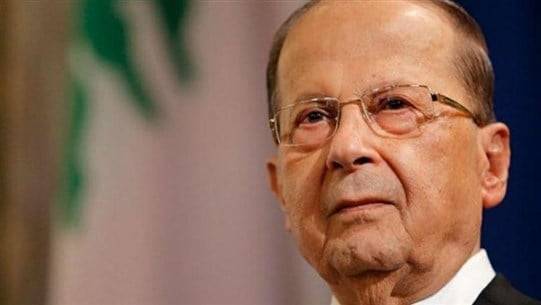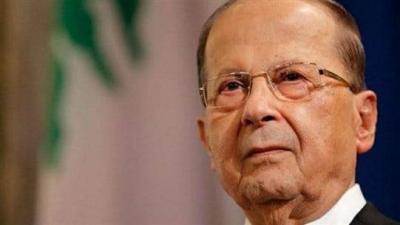As the countdown to departure from Baabda begins, President Michel Aoun has positioned himself with his "finger on the trigger" regarding the governmental situation, suggesting that the signing of the decree accepting the resignation of Prime Minister Najib Mikati's cabinet (which has been resigned by law since last May after the parliamentary elections) is imminent. This is an attempt to hinder the transition of the caretaker government's powers to the presidency, while simultaneously working to "scuttle" the dialogue prepared by Parliament Speaker Nabih Berri. Both Aoun and MP Gibran Bassil have accused them of planning to "seize" the presidential position and its powers with a prior intent, leading towards a "dual vacancy."
The discussions surrounding "preparing" the decree for accepting the resignation and the charged atmosphere towards Mikati and Berri are interpreted as an indication that forming a government has become nearly impossible—according to Aoun’s own hints in a television interview. The political implications of this move, which may potentially affect the Taif Accord, are more significant politically than constitutionally. Experts and legal scholars agree that if the decree for the government's resignation happens, its character will announce the resignation rather than create any consequential implications, as this decree does not halt the current government’s operations. Such halting only occurs with the issuance of a new government formation decree, which, according to tradition, accompanies the decrees for accepting resignations and naming a new prime minister.
Therefore, the political dimension of Aoun’s resorting to this "heavy constitutional weapon" remains crucial, as it indicates that the general will lead an "opposition front" from Rabieh based on sectarian mobilization. There are observations that the "decree for accepting the resignation" is nearly "expired" since Mikati himself has rendered it nearly void through implications that the transfer of presidential powers to his resigned government does not acquire it any status outside of caretaking authorities. Additionally, the cue for ministers to abstain from performing their duties under this framework aims to prevent the Cabinet from convening, which could facilitate a collective transfer of presidential powers. However, it is argued this is moot since Mikati will not call for meetings unless absolutely necessary and will continue meetings he holds "on the file" at hand.
Sources close to the caretaker prime minister conveyed that "the signature on the decree to accept the government's resignation is unnecessary and can be considered nonexistent, and it does not change anything in reality." They urged to consider constitutional expert Edmond Rizk's comment equating this matter to "high treason." They argued that "Prime Minister Mikati has repeatedly confirmed that he will not be confrontational or provocative, as he can only fulfill what the constitution vests him with."
Mikati himself previously noted, "We are entering a new phase characterized by the fact we will not challenge anyone or stand against any matter that serves Lebanon and its people." He emphasized a desire for an end to disputes for the sake of people and production sectors. He mentioned potential winter tourism, suggesting a constant flow of flights to Lebanon during Christmas and New Year's, and called for cooperation to address the difficult situations and restore recovery.
Mikati's calm demeanor, as he prepares to head to Algeria to lead Lebanon's delegation at the Arab summit, reflects that the governmental issue is now behind everyone, with attention only on the end of a term that has left him with allies like Hezbollah. The latter is perceived to have "loaned" Bassil, who met with Mr. Hassan Nasrallah four days ago, as a means to obstruct his ministers from any gathering of the caretaker government under a "presidential hat," seen as an empty "check" and merely a political stance amidst Mikati's efforts to de-fuse constitutional confrontations and manage the post-vacuum phase while avoiding overextending Christian support from substantial parties such as the Lebanese Forces and others who believe in the constitutional nature of inheriting caretaker governmental powers.
These elements converge to position the decree for accepting the resignation as a "sonic bomb" that could draw the parliament, as the constitutional interpretation authority, into declaring the illegality of Aoun's action, and consequently, granting Mikati and his government an indirect "valuable confidence." Meanwhile, Speaker Berri, whose relationship with Aoun is characterized by "lost camaraderie," has not hesitated to respond in kind to the president and Bassil’s remarks suggesting that "even if my presidential term ends, Berri has no right to take the place of the president, and discussions concerning the presidency will fail."
Basil’s remarks yesterday implicitly targeted the "Lebanese Forces": "They sold the presidential powers under the Taif Agreement and continue to fail to implement its best aspects. They are preparing after October 31 to sell what's left of the powers to Najib Mikati and Nabih Berri and are ready to resist to stop them from taking them... We have warned and alerted."
In a statement from the leadership of the "Amal" movement, citing that "to prevent silence from being interpreted as acquiescence to the ravings of those haunted by nightmares and anxieties," it noted, "It is regrettable to see the slander faced by President Berri emanating from known circles, who argue that the Speaker has no right to call for dialogue or assume presidential powers, conveniently forgetting the 2006 dialogue with him present, when the demand was for his participation in the government."
The statement also referenced efforts to obscure Berri's role in reaching consensus on maritime borders with occupied Palestine, asserting his foundational role prior to and during the current term's ending, concluding with, "It is a calamity of fate that calling for dialogue has become a crime while sowing dissent, fragmentation, and vacancy is praised. What a shame."




